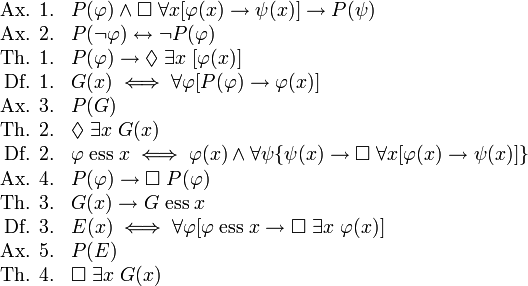 Albert Einstein with Kurt Gödel
Albert Einstein with Kurt GödelMathematician Kurt Gödel is famous for his investigations into paradoxes, and was also a noted philosopher. His methodology of producing paradoxes are a keystone to this blog. Gödel was so caught up in paradoxes that he almost blew his US Citizenship over his finding that the US Constitution had an inconsistency. He was fortunate that his friends Albert Einstein and Oskar Morgenstern, who invited themselves as witnesses and handlers, were able to defuse the situation, with the judicious steering of Justice Phillip Foreman.
According to the wiki: he proved for any computable axiomatic system that is powerful enough to describe the arithmetic of the natural numbers (e.g. the Peano axioms or ZFC), that:
- If the
Gödel is also known for his Ontological Proof of the Existence of God. His methodology is also responsible for the disproof of God's Existence that "God cannot create a rock too large for him to lift." Here, mostly for decoration but partly for the curious, is Gödel's Proof of the Existence of God:

Paradoxes derive from self-referentiality. A statement that refers to itself creates paradoxes abot itself. For example, "This statement is False." is neither a True or a False statement, especially because it is self-contradictory. Likewise, "This statement is True" is both True and False.
Theologically speaking, it can be argued that God is the most self-referential object in the Universe, making Him the most paradoxical object in the Universe. How many times have you read in the Bible that God is beyond Human Understanding? This certainly hints at Gödel's Proof.
This brings me to this blog's purpose. The question I continually ask is "What must be True for Biblical Integrity." I take a doctrine, say Predestination, and compare it to my Question of Biblical Integrity, amd if I get a Paradox, I question that Paradox. This reasoning is of necessity, Deductive Reasoning, It generally has to be devoid of Hermeneutics because Hermeneutics is based upon Inductive Reasoning, and Hermeneutic methods introduce extraneous paradoxes by introducing unnecessary self-referentially to the Scriptures.
Here's where Faith comes in. I am counting upon the Scriptures to be consistant. However, because "The consistency of the axioms cannot be proven within the system", I have to discard Sola Scriptura. That Proof From Without comes that collection of writings called Tradition (i.e., commentaries by early Saints and Scholars, Church Councils, Histories, and early Training Manuals). From the Orthodox Point of View, the Scriptures were a special part of Tradition that was elevated by Church Council to be the Bible. This means that if there are inconsistancies, they will occur within Tradition. [OK, this paragraph may still have a few inconsistencies. I'll probably have to spend a lifetime to get it right only to discover that this is an impossibility, but at least I have written a rough draft of what I meant to say. Gödel must be having lots of fun in Heaven watching me struggle with this.]



No comments:
Post a Comment